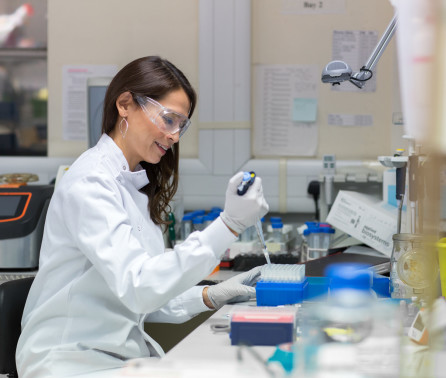We are developing novel, rapid diagnostic solutions for the detection of infections and genes associated with antimicrobial resistance to guide treatment decisions, optimise antimicrobial use and support infection control interventions. In conjunction with NHS partners at Imperial College Healthcare NHS Trust and the Centre for Bio-Inspired Technology in the Department of Electrical and Electronic Engineering we have developed tools for the detection of CPE, colistin resistance (mcr), SARS CoV-2 and pathogens associated with Respiratory Tract Infections (RTI).
Our Technical Developments
- Point-of-Care Solutions
- Artificial Intelligence / Machine Learning Solutions
- Molecular Assay Development
Rapid diagnostics are needed to guide treatments, support clinical management and reduce inappropriate antimicrobial use. Real-time infection mapping is essential to identify and monitor outbreaks, which is particularly important in regions where surveillance data and laboratory access is limited. We have developed an innovative diagnostic platform based on semiconductor microchip technology, which provides a low cost, scalable, rapid and portable solution. Quantitative test results are provided on a smartphone application in under 20 minutes and synchronised to a cloud server for real-time tracking of disease progression and surveillance.

We are harnessing emerging innovations in machine learning and artificial intelligence to increase the throughput of molecular diagnostic platforms without any hardware changes. The methods we are developing leverage machine learning approaches to distinguish a nucleic acid amplification reaction based on its molecular signatures (i.e. kinetic and thermodynamic information). This gives rise to affordable solutions for detecting infectious diseases and antimicrobial resistances by simply increasing the outputs of existing data without changing the PCR technologies themselves.

We are specialised in a broad range of amplification chemistries and methods, including assay design, assay validation and sample testing. The assay development is supported by our extensive expertise in bioinformatics. Applications include absolute quantification, SNP genotyping and high-level multiplexing assays with a strong experience in quantitative real-time PCR (probe and dye-based), isothermal amplification (e.g. LAMP and RPA) and state-of-the art digital PCR.

Reinventing Multiplexing PCR: a 3-minute thesis
Luca Miglietta is a joint PhD student in the Department of Infectious Disease and Electrical and Electronic Engineering at Imperial College London. This short video presents some of the work of his PhD on developing novel PCR technology called "data-driven multiplexing" in collaboration with the JRM group (PI: Dr Jesus Rodriguez Manzano) and CAMO.
Researchers
Dr Darius Armstrong-James
/prod01/channel_3/media/imperial-college/medicine/nihr-hpru-hai-antimicrobial-resistance/Darius.jpeg)
Dr Darius Armstrong-James
Reader in Infectious Diseases and Medical Mycology
Dr Jesus Rodriguez Manzano
/prod01/channel_3/media/migration/research-groups/jesus-rodriguez-manzano_1605111016989_x4-2.jpg)
Dr Jesus Rodriguez Manzano
Deputy Director of CAMO / Lecturer in Antimicrobial Resistance and Infectious Diseases
Professor Pantelis Georgiou
/prod01/channel_3/media/migration/research-groups/pantelis-georgiou_1605111147174_x4-1.jpg)
Professor Pantelis Georgiou
Chief Scientist / Professor in Biomedical Electronics
Ahmad Moniri
/prod01/channel_3/media/migration/research-groups/ahmad-moniri_1605260754736_x4.jpg)
Ahmad Moniri
Research Postgraduate
Dr Anand Shah
/prod01/channel_3/media/migration/research-groups/anand-shah_1612774053216_x4-1.jpg)
Dr Anand Shah
Honorary Clinical Senior Lecturer
Ivana Pennisi
/prod01/channel_3/media/migration/research-groups/ivana-pennisi_1605260829431_x4.jpg)
Ivana Pennisi
Research Assistant
Kenny Malpartida Cardenas
/prod01/channel_3/media/migration/research-groups/kenny-tojpeg-1553602827206-x1_1605114806957_x4.jpg)
Kenny Malpartida Cardenas
Research Postgraduate
Lewis Keeble
/prod01/channel_3/media/migration/research-groups/keeble-lewis-3-tojpeg-1572608266962-x1_1605115033094_x4.jpg)
Lewis Keeble
Research Postgraduate
Luca Miglietta
/prod01/channel_3/media/migration/research-groups/l-miglietta_1605105658271_x4-2.jpg)
Luca Miglietta
Research Assistant in Diagnostic Microbiology
Matthew Cavuto
/prod01/channel_3/media/migration/research-groups/matthew-cavuto_1605260877614_x4-1.jpg)
Matthew Cavuto
Research Assistant
Nicolas Moser
/prod01/channel_3/media/migration/research-groups/moser-nicolas-1-tojpeg-1579950601639-x1_1605197554647_x4-1.jpg)
Nicolas Moser
Research Associate


